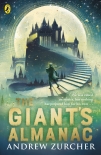The Giant's Almanac, Andrew Zurcher [accelerated reader books txt] 📗

- Author: Andrew Zurcher
Book online «The Giant's Almanac, Andrew Zurcher [accelerated reader books txt] 📗». Author Andrew Zurcher
‘“Two nights I have told you the story of the king of this place. Once the greatest conqueror the world has ever seen, once the richest man in a thousand kingdoms, to the sands and the hope of his heir he committed everything he had – to a little beggar boy, to a child who came across the sands, and disappeared, at last, back into them. This king gave all, and in giving all, became at once a beggar himself, and the subject of our story. Now, ask yourself, brother merchant,” he said to me, “would you be half so moved by his story, half so eager to hear its conclusion, if I told you that this king had yet another treasury, as large as the first that he buried in the sands? If I told you that he married a new wife, that she bore him a new heir, and that he bequeathed this heir the greater part of his kingdom, which passed by a long dynasty in unbroken succession through many ages, would you have come with me tonight, eager, concerned, engaged, and – my friend – full of compassion?”
‘I pondered this while I watched the beggars before me supping their thin broth. At last I admitted to him what I wished I could forget – what I wish, my eyes, I could forget even now – that I had heard his story with compassion because it was a terrible story, because I had assumed it would have a terrible end.
‘“And so it does, brother merchant,” he told me. “And this is why we listen to all stories, both those that end well, and those that end badly – because no matter what we do, we cannot change them, cannot reach through the wide abyss of time, or the impassable void that stands between what is real, and what is not. And indeed, in this respect, no story ends well, but it asks our compassion, and receives it, because it must forever fall short of that fullness of truth and fulfilment that even these beggars, starving as they are, enjoy. How much happier to be a beggar, living forever on the very walls of survival, than to be nothing but the subject of a tale!
‘“The sad king, poor and joyless, grew weak and unable to govern. His riches he had buried in the sands, and with his riches his power, his influence and his security. One by one, then by tens, and scores, his vassal kingdoms revolted. One by one, then by tens, and scores, his liege lords and his captains abandoned him. In the end, only his council remained, along with the eight generals who had from the first directed his campaigns. He became a prisoner in his own palace.
‘“One solace was afforded him in those, almost the last of his days. Every afternoon as the desert’s heat relented, and the cool scent of well water, infused with the fragrance of jasmine blooms, spread in his private courts, his brother the former wazir came to him to play shatranj. This one game had occupied them for many years, ever since the day that his brother had become the king’s wazir – that is, ever since the day that the little beggar boy had saved the king’s life. They were locked in a mansūba which has become since their time very famous, and is known as the Sad King. It has only one solution, a solution which neither of these players – dedicated and not unskilful, but neither of them great masters – had yet discovered. Day by day they sat opposite one another, and regarded the board between them. Birds sang among the flowers in the courtyard gardens, and lesser lives came and went, much like the birds, much like their song, passing around the two ageing men as they confronted one another over the board. From time to time, sometimes after many months of quiet, one of them would move a piece from one square to another; in some years, one or the other of them would capture one of his opponent’s pieces. But these moments were rare, and growing rarer. It was not clear to either of them whether the game would ever end.
‘“One afternoon the old wazir, who had long since given up his post, came to the terrace outside the king’s chambers, where the great board lay spread beneath the tamarisk trees, in the scent of cinnamon and cloves, ready for the continuation of their game. He looked at it, at its alternating squares of black obsidian and beaten gold foil, latticed with miniature sapphires and carved with verses of love, and war, and contemplation. Its pieces to one side were cut from whole rubies, to the other from whole emeralds, dazzling in their size and purity, some of the most valuable gems ever to have been mined in the dark bowels of the grudging earth. They were things of great rarity and, if it was possible, of greater beauty; to touch them, which a few times he had, was to the old wazir an exquisite pleasure. As he stood waiting for his brother, he regarded them with unalloyed pleasure.
‘“But of late, whether by accident or some unconscious design of his own, the pieces on the board had become configured in a shape that seemed to him a great reproach. His





Comments (0)